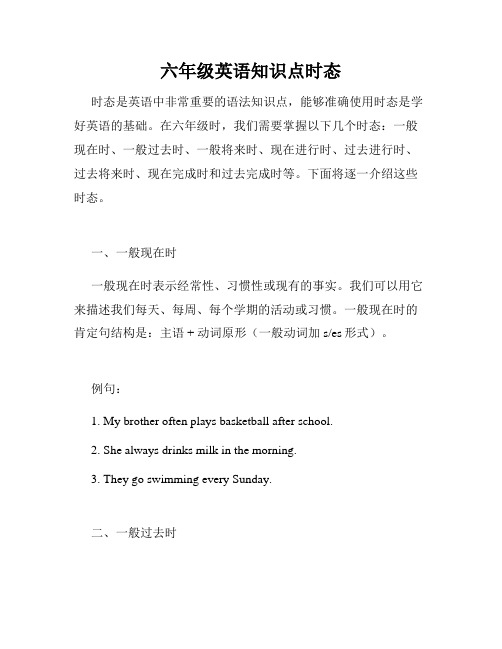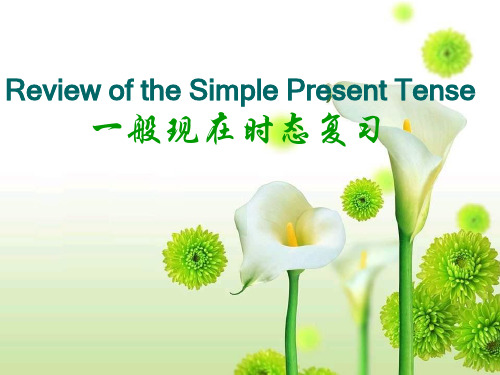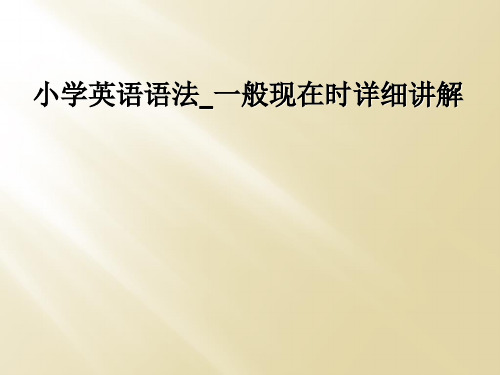一般现在时肯定句与其他动词
一般现在时

一般疑问句:Be+主语+表语?
Be的用法口诀 I用am; you 用are, is连着he, she,it; 单数名词用is,复数名词全用are。 变疑问,往前提,句末问号莫丢弃。 变否定,更容易,be后not莫忘记。 疑问否定任你变,句首大写莫迟疑.
1.It is a red pen. 2.He is Eric. 3.That is my map. 4.Her name is Mary. 5.I am Jenny.
把下面的句子变一般疑问句并作肯、否定 回答,否定句.
1.He has a TV. 2.She has an alarm clock. 3.Sally plays ping-pong every day. 4.My sister has a nice ring. 5.Her parents have 3 sons.
• • • • • • • • • • • • •
按要求做题: (10分) 1.He ______(have) a notebook. has 2.Maria and I_______(have) a basketball. have 3.Li Ping has a soccer ball.(变为一般疑问句) Does Ping have soccer ball? ____Li ____a 4.Does she have a CD?(做肯定回答) Yes,shedoes . ____ 5.He has a baseball bat.(变否定句) He doesn’t have baseball bat. ____ ________a 6.You have a volleyball.(一般疑问句) ______you have a volleyball? Do 7.The boy doesn’t have a TV.(肯定句) The boy ______ a TV. has
英语学习中常见的几种时态介绍

英语学习中常见的几种时态介绍中,常见的有一般现在时、现在进行时、一般将来时、一般过去时、过去进行时、现在完成时和一般过去将来时等时态,是我们在学习过程中必须掌握的。
掌握好这几种时态,对于学习英语的同学是大有益处的,在变换句式时经常要运用。
现我把学习过程中经常遇见的13种时态整理如下,供学习参考:一、一般现在时(The Indefinite Present Tense).一般现在时表示经常性的或习惯性的动作、特征或状态。
常见的一般现在时主要有以下三种句式:1.肯定句式。
一般现在时肯定句式主要由动词原形表示,第三人称单数的谓语动词后要加词尾-s或-es。
动词be根据主语不同的人称有不同的形式,第一人称单数中动词be用am,第一人称复数、第二人称单数和复数以及第三人称复数中动词be用are的形式,第三人称单数中动词be用is,动词have在主语是第三人称单数中变为has,其余情况均用原形have。
如:She is a worker.They are worker.He has a bike.We have a bike.I am the king of the world.2.疑问句式。
一般现在时变为疑问句时,一般在句首加助动词do或does的方式构成,第三人称单数时用does,其余情况都用do,主要动词一概不变,用原形;在以have或has为主要动词的句子中,可以直接将动词have或has提前放于句首,也可以在句首加动词do或does构成,have或has一律用原形have。
如:Do you work?Does he work?Has she a cake?Does she have a cake?其简略回答形式用“Yes+主语+动词”或“No+主语+动词+not”。
如:Yes, I do.No, he does not.Yes, she hasNo, she has not.3.否定句式。
一般现在时的否定句式在动词前加do/does not的形式构成。
一般现在时态讲解

一般现在时态讲解公司内部档案编码:[OPPTR-OPPT28-OPPTL98-OPPNN08]一般现在时态讲解一般现在时(de)用法:1.表示经常性、习惯性(de)动作或存在(de)状态.eg. I go to school on foot. He is very busy now.2.表示主语(de)特征、性格、能力、爱好等.eg. He can swim. I work hard. I like watching TV.3.表示客观真理 eg. There are seven days in a week. 否定句:主语+be+not+其他 eg. Danny is not a good student. 一般疑问句:Be+主语+其他 eg. Is Danny a good student(2)句中有实意动词,如work, go, get, help, study, play 等表示主语(de)动作肯定句:主语+谓语动词+其他 eg. I work hard at school.否定句:主语+don’t 或doesn ’t+谓语动词原形+其他 eg. I don’t work hard at school.疑问句:Do 或Does + 主语+ 动词原形+其他 eg. Do I work hard at school . They have lunch at 12:00.They don’t have lunch at 12:00. Do they have lunch at 12:00注意:单数第三人称做主语时,谓语动词要用单三形式,变否定句须在动词前加助动词doesn’t;变一般疑问句须在句首加助动词does.. Jenny speaks English very well.Jenny doesn’t speak English very well. Does Jenny speak English very well动词第三人称单数(de)变化规则如下: (1)直接在动词词尾加-s.ask---asks work---works get---gets stay---stays play — plays like — likes(2)以字母s, x, ch, sh 或o 结尾(de)动词,在词尾直接加-es.watch---watches wish---wishes fix---fixesdo---does go---goes pass---passes(3)以“辅音字母加 - y”结尾(de)动词,要先变y 为i 再加-es. try---tries study---studies cry---cries fly---flies (4)不规则变化: have----has一般现在时态(de)时间状语为often、 usually、 always、 sometimes等频率副词,on Saturdays、 in the morning(afternoon evening) 、every day 等.常见错误:be动词与实意动词同时出现在句子中例:We are plant (plant) the trees in spring.(误)正解:We plant (plant) the trees in spring.解析:在英语中,be是表状态,do是表动作,两种动词不能同时出现在句子中,可记住如下口诀:“英汉语言有差异,be 、do不能放一起,仔细琢磨细分析,语法千万要牢记.”一般现在时态练习一般现在时态(de)时间状语为often、 usually、 always、 sometimes,on Saturdays、 in the morning/afternoon/ evening 、every day、every week 等.I.用所给词(de)正确形式填空1. We often___________(play) on the playground.2. He _________(get) up at six o’clock everyday.3. __________you _________(brush) your teeth every morning4. What____ (do) he usually _____(do) after school5. Danny _______(study) English, Chinese, Math, Science and Art atschool.6. Mike sometimes __________(go) to the park with his sister.7. At eight at night, she ________(watch) TV with his parents. 8. ________ Mike________(read) English every day9. How many lessons ______your classmate_______(have) on Monday10. What time _______his mother_________(do) the housework11. He often ______(have) dinner at home.12. Daniel and Tommy________ (be) in Class One.13. We___________________ (not watch) TV on Monday.14. Nick _____________________(not go) to the zoo on Sunday.15. They___________ (like) the World Cup16. What ______they often __________(do) on Sat urdays17. Your parents___________ (read) newspapers every day.18. The girl___________ (teach) us English on Sundays.19. She and I _____________(take) a walk together every evening.20.There____________(be) somewaterin the bottle.21. Mike _____________(like) cooking.22.They____________(have) the same hobby.23. My aunt_____________ (look) after her baby carefully.24. Youalways__________(do) yourhomeworkwell.25. I___________ (be) ill. I’m staying in bed.26.She_________(go) to school from Monday toFriday.27. Liu Tao _________(do) not like PE.28. Thechildoften___________ (watch) TV in the evening.29. Su Hai andSuYang _________(have) eight lessons thisterm.30. -What day _________(be) it today -It’s Saturday.31. Don’t make a noise. Grandpa __________________(sleep).32. Tom’s family__________(watch) TV.33. ---What ______ your mother _______(do) every evening---She _______(wash) clothes.34. _______ it______(rain)every day35. --What _______ you _______(do) on Sundays --We ________ (play) football.36. There ________ (be) a football match on TV every morning.37. They often ________ (visit) the Gre at Wall.38. He _____________ (not come).39. The earth __________ (move) round the sun.40.Mr. Wang often______( go) to Shanghai.Π. 以My School Life为题写一篇小短文,不少于60词.__________________________________________________________________ __________________________________________________________________ __________________________________________________________________ __________________________________________________________________ __________________________________________________________________ __________________________________________________________________ __________________________________________________________________ __________________________________________________________________ __________________________________________________________________ ______________________________________________________。
六年级英语知识点时态

六年级英语知识点时态时态是英语中非常重要的语法知识点,能够准确使用时态是学好英语的基础。
在六年级时,我们需要掌握以下几个时态:一般现在时、一般过去时、一般将来时、现在进行时、过去进行时、过去将来时、现在完成时和过去完成时等。
下面将逐一介绍这些时态。
一、一般现在时一般现在时表示经常性、习惯性或现有的事实。
我们可以用它来描述我们每天、每周、每个学期的活动或习惯。
一般现在时的肯定句结构是:主语 + 动词原形(一般动词加s/es形式)。
例句:1. My brother often plays basketball after school.2. She always drinks milk in the morning.3. They go swimming every Sunday.二、一般过去时一般过去时表示发生在过去某个具体时间或某一段时间中的动作或状态。
一般过去时的肯定句结构是:主语 + 动词过去式。
例句:1. We went to the zoo yesterday.2. He played soccer last weekend.3. She studied Chinese history last year.三、一般将来时一般将来时表示将要发生的动作或存在的状态。
一般将来时的肯定句结构是:主语 + will + 动词原形。
例句:1. I will visit my grandparents next month.2. We will have a picnic in the park tomorrow.3. She will clean her room this evening.四、现在进行时现在进行时表示现在正在进行的动作。
现在进行时的肯定句结构是:主语 + am/is/are + 动词ing形式。
例句:1. They are playing tennis in the park now.2. She is reading a book at the moment.3. We are watching a movie.五、过去进行时过去进行时表示在过去某个时间点正在进行的动作。
一般现在时确定用

8 _____ your teacher _____(help) you learn math?
9 _____ Bill _____(do) his homework every day? 10 How many lessons ______ your classmate _____(have) on Monday? 11 What time_____ his mother____ (do) the housework? 12 What _____ he usually _____(do) after school?
1 I speak English.(变成一般疑问句并作肯定回答)
2 He speaks Chinese.(变成一般疑问句并作否定回答) 3 Jack likes playing computer.(变成一般疑问句并 作肯定回答) 4 We usually go to school by bus.(变成一般疑问 句并作否定回答)
1 We often _____(play) in the playground. 2 They _____(have) the same hobby. 3 Daniel and Tommy _____(be) in Class One. 4 She and I ______(take) a walk together every morning. 5You always ______(do) your homework well. 6 We often _____(not play) in the playground. 7 They _____(not have) the same hobby. 8 Daniel and Tommy _____(not be) in Class One.
小学英语语法_一般现在时详细讲解

变否定句
They are students. They are not students.
变否定句
She can speak English. She can not speak English.
一般现在时
(否定句)
句中没有be动词或情态动 词时,主语为第三人称单数的 否定句在动词前加does not (doesn’t),非单三时,否定 句在动词前加do not(don’例t如)
She is often late for school.
2. 表示表示客观事实
You are 13. He is a student.
You study at Olympic Garden Middle School.
3. 表示永恒不变的真理;
The moon goes round the earth.
It looks like a cat. 它看起来像只猫。
二、单个人名、地名或称呼作主 语;是第三人称单数。
①Han Mei looks like her mother. 韩梅看起来像她的母亲
②Beijing is in China. 北京在中国。 ③Uncle Wang often makes cakes.
Do+主语+动原…? Does +三单主语+动原…?
Do you go to school…?
Does he go home…?
哪些主语是第三人称单数?
一、人称代词he, she, it是第三人称单 数。
He likes watching TV. 他喜欢看电视。 She has lunch at twelve. 她十二点吃午餐。
3、实义动词第三人称单数的动词形式变化规则
英语一般现在时的表示方法
英语一般现在时的表示方法
英语一般现在时 (Simple Present Tense) 是表示动作或状态一直存在或持续进行的时态,通常由"be 动词 (am、is、are)+现在分词"构成,用于描述当前正在进行的动作或状态。
以下是一般现在时的构成方式:
1. 肯定句:主语 + be 动词 (am/is/are)+ 现在分词 (动词
+ing)+其他成分
例如:I am studying for my exam.
2. 否定句:主语 + be 动词 (am/is/are)+ not + 现在分词 (动词+ing)+其他成分
例如:I am not watching TV right now.
3. 疑问句:Be 动词 (am/is/are)+主语 + 现在分词 (动词
+ing)+其他成分+?
例如:Are you listening to me?
总结起来,一般现在时的使用主要是为了描述当前正在进行的动作或状态,通常用于现在时态的开头,例如:"I am eating breakfast"(我正在吃早餐)。
专题08 一般现在时_备战2021年小升初英语必考语法和题型(解析版)
专题08 一般现在时一、一般现在时的概念1. 一般现在时是表示经常或反复发生的动作。
如:I watch TV every day. 我每天看电视。
He always goes to work by bus. 他总是坐公交去工作。
Linda usually goes home at six in the afternoon. 琳达常常在下午六点回家。
2. 表示人或事物的特征、状态。
如:Mary is very thin. 玛丽非常瘦。
She is a teacher. 她是一名教师。
3. 表示客观事实。
如:The earth goes around the sun. 地球围绕太阳转。
The sun rises (rise) in the east and sets (set) in the west. 太阳东升西落。
二、一般现在时的基本用法一般现在时的构成及句式变化主要有含be动词和实义动词两种句型。
1. 含有be动词的一般现在时句型(1) 肯定句:主语+be(am/is/are) +其他,如:I am (be) a driver. 我是一名驾驶员。
He is (be) a good boy. 他是一个好孩子。
(2) 否定句:主语+be not+其他,如:They are not (be not) farmers. They are (be) workers. 他们不是农民,他们是工人。
(3) 一般疑问句:Be+主语+其他?肯定回答:Yes,主语+be否定回答:No,主语+be+not例:I am from China. 我来自中国。
(改为一般疑问句并作回答)—Are you from China? 你是来自中国的吗?—Yes, I am. 是的,我是来自中国。
—No, I am not. 不是,我不是来自中国。
2. 含有实义动词的一般现在时句型。
(1) 肯定句:主语+动词原形+其他。
(主语为非第三人称单数时用)主语+动词三单+其他。
一般现在时动词变换规律
具体解释如下: 1.动词发生变化。在一般现在时的肯定句中,若主语是第三 人称单数,实义动词要发生变化,简称:肯定句,主 单三,动词变。(特殊注意:若主语不是第三人称单 数时,实义动词则不发生变化。) My mother often makes cakes for us They speak English every day We go to school by bike every day 2.要出现助动词。在一般现在时的否定句或疑问句中要出现 助动词do或does。若主语是第三人称单数,助动词用 does;若主语不是第三人称单数,助动词用do。 (特殊注意(1).在一般疑问句中,助动词要放在句首。 (2).在否定句中,助动词要放在主语的后面,实义动词的前 面。
一般现在时实义动词的变化规律口诀?我们在学习一般现在时的句子中接触到了两种动词一种是系动词beamisare用法比较简单另外一种是实义动词也称作行为动词
一般现在时实义动词的变化规律口诀
• 我们在学习一般现在时的句子中接触到了两种动词,一 种是系动词be (am , is are )用法比较简单,另外一种是 实义动词,也称作行为动词。在有实义动词的句子中, 实义动词的形式经常会有变化,为了方便同学门的学习 和记忆,现将其以口诀的形式出现。 • 实义动词现在时, 肯定句中两形式。 • 主语单三动词变, 除此之外莫变换。 • 否定疑问不麻烦, 助动词必须出现, • 主语单三does见 , 其余主语do 替换, • 否定疑问动用原。 特殊情况总会变, • 主定提问动单三, 助动词不再露面。
They don’t come from America Do you have an eraser ? • 特例:在对句子的主语或主语的定语进行提问时, 句子中不出现助动词,谓语动词用第三人称单数 形式。例如: Miss Zhang teaches us English.(对划线部分提问) Who teaches you English ? Who sits behind you ? Li Lei does • 重点语法相关练习: • 句型转换
一般现在时用法
一般现在时形式:1、主语(第一、二人称和复数)+ 动词原形+ 宾语2、主语(第三人称单数)+ 动词词尾要加-S + 宾语构成:一般现在时用行为动词的原形,但第三人称单数作主语时,动词的词尾要加S(一般的动词词尾加S;以sh、ch、s、x、o结尾的词加es;.以辅音字母Y结尾的把Y变成i再加es )一、一般现在时的用法:1)一般现在时表示现在的状态。
如:He is twelve years old.2) 经常性或习惯性的动作,常与表示频率的副词或时间状语连用。
时间状语:often, always, usually, sometimes , never、hardly ever、every morning、at night、at noon、in the evening、every day、twice a week 等。
如:I read English every morning.She sometimes goes shopping on Sundays.3) 客观真理,客观存在,科学事实。
如:The earth moves around the sun.Shanghai lies in the east of China.4) 表示格言或警句中。
如:Pride goes before a fall. 骄者必败。
5) 表示主语具备的性格和能力等。
如:She likes apples.They speak English.6)倒装句,表示动作正在进行,如:Here comes the bus. = The bus is coming. There goes the bell. = The bell is ringing.7) 一般现在时Be动词情况:am,is,are也可以做一般现在时的助动词如:I am a student.二、一般现在时的肯定句、否定句和一般疑问句:肯定句:I am…He、She、It is …We 、You 、They are…否定句:I am not…He、She、It is not…We 、You 、They are not…一般疑问句:Do you(they)…?Does she (he)…?如:We go to school at seven every day.We don’t go to school at seven every day.Do you go to school at seven every day?Yes,we do. No,we don’t.。
- 1、下载文档前请自行甄别文档内容的完整性,平台不提供额外的编辑、内容补充、找答案等附加服务。
- 2、"仅部分预览"的文档,不可在线预览部分如存在完整性等问题,可反馈申请退款(可完整预览的文档不适用该条件!)。
- 3、如文档侵犯您的权益,请联系客服反馈,我们会尽快为您处理(人工客服工作时间:9:00-18:30)。
一般现在时肯定句与其他动词
Present Simple Positive with other verbs Make positive present simple sentences:
1.(he / go to school every day)
He goes to school every day
2.(I / like swimming)
3.(you / play badminton on Saturdays)
4.(the class / begin at 9 a.m.)
5.(they / sometimes go to the cinema)
6.(she / love chocolate)
7.(we / study French)
8.(they / live in London)
9.(he / work in a restaurant)
10.(Lucy / play the guitar)
11.(we / cook every day)
12.(he / clean the house at the weekends)
13.(I / like reading detective stories)
14.(you / come from France)
15.(John and David / often go to restaurants)
16.(Susie / study English every night)
17.(the train / leave at 6 p.m.)
18.(we / go to the park on Sundays)
19.(he / likes taking photographs)
20.(the moon / go round the earth)
Answers:
1.He goes to school every day.
2.I like swimming.
3.You play badminton on Saturdays.
4.The class begins at 9 a.m.
5.They sometimes go to the cinema.
6.She loves chocolate.
7.We study French.
8.They live in London.
9.He works in a restaurant.
10.Lucy plays the guitar.
11.We cook every day.
12.He cleans the house at the weekends.
13.I like reading detective stories.
14.You come from France.
15.John and David often go to restaurants.
16.Susie studies English every night.
17.The train leaves at 6 p.m.
18.We go to the park on Sundays.
19.He likes taking photographs.
20.The moon goes round the earth.。
